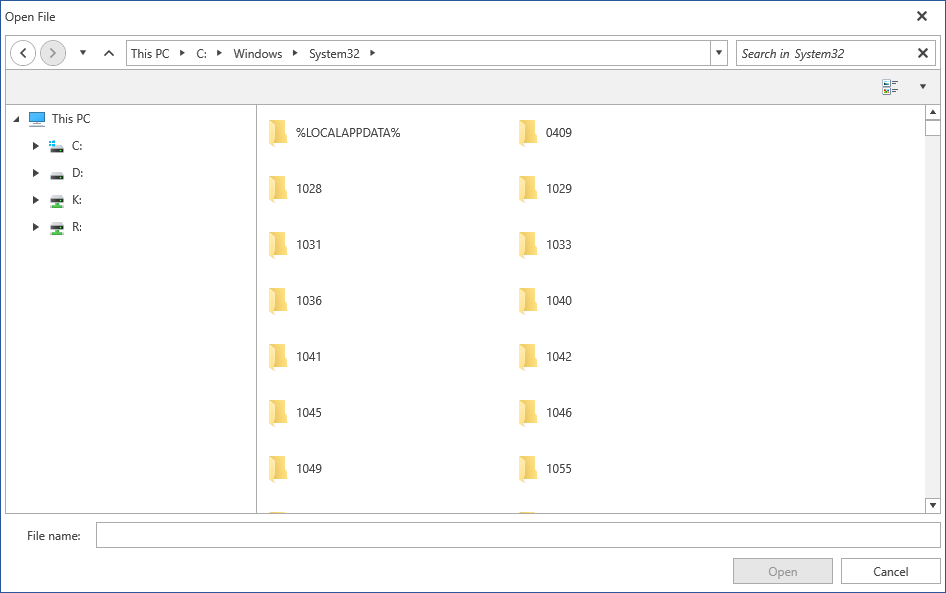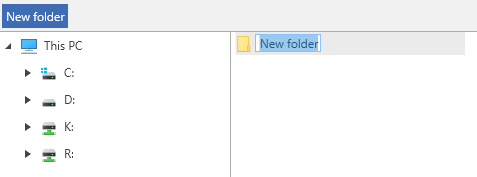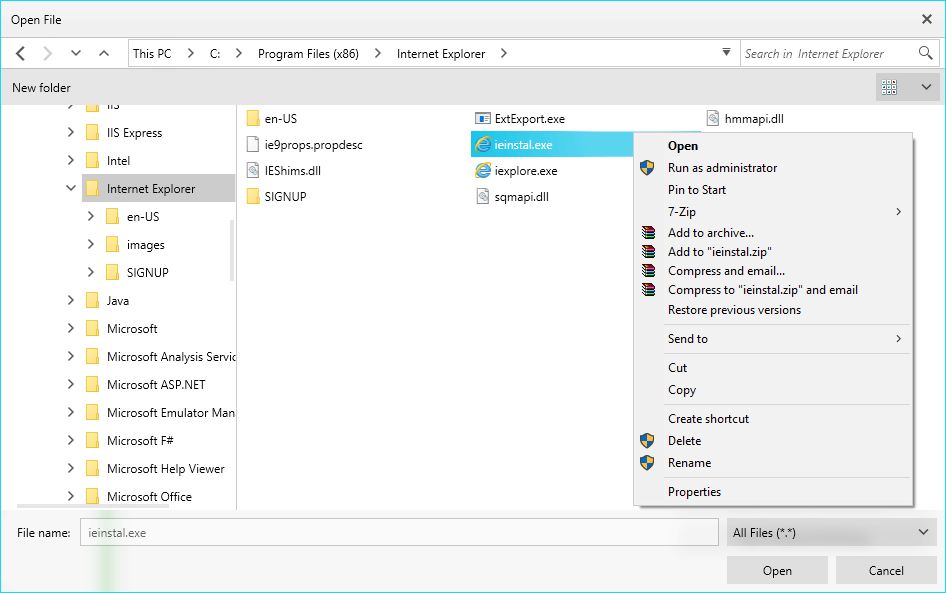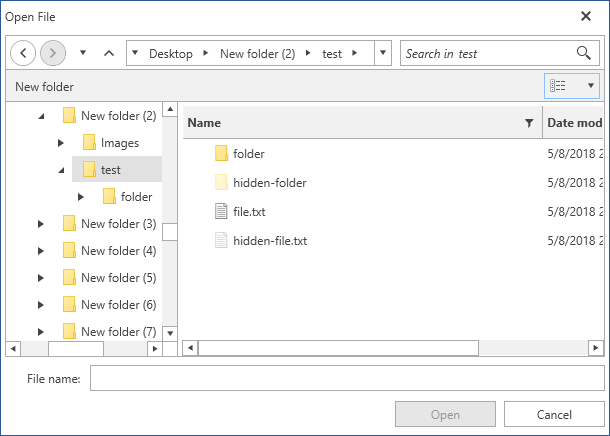Common
This articles shows the features shared between all file dialogs controls - RadOpenFileDialog, RadSaveFileDialog, RadOpenFolderDialog and ExplorerControl .
Setting Initial Directory
All the dialog controls expose a InitialDirectory property that determines the directory that will be opened when the dialog shows.
Setting initial directory
RadSaveFileDialog saveFileDialog = new RadSaveFileDialog();
saveFileDialog.Owner = this;
saveFileDialog.InitialDirectory = @"C:\Temp\";
saveFileDialog.ShowDialog();
Setting the Initial Layout of the Tiles
All the dialog controls expose a InitialSelectedLayout property that determines the initial layout of the list with the files
Setting initial layout
RadSaveFileDialog saveFileDialog = new RadSaveFileDialog();
saveFileDialog.Owner = this;
saveFileDialog.InitialSelectedLayout = Telerik.Windows.Controls.FileDialogs.LayoutType.Tiles;
saveFileDialog.ShowDialog();

The layout is determined by the LayoutType enum that provides the following modes:
SmallIcons
MediumIcons
LargeIcons
ExtraLargeIcons
List
Tiles
Details
New Folder Button
Since R1 2018, you can add a new folder in all the dialog controls with the New Folder button. The created folder enters edit mode in all Layout View Modes.
New folder button and new folder in edit mode in the Office2016 theme

Edit Mode
In order to edit the selected file/folder, you can press the F2 key. Alternatively, you can click on the TextBlock which holds the file/folder name in all layouts except the Details layout where you can click on the cell holding the file/folder name. If you try to add a reserved character in a file/folder name, you will receive the warning illustrated below.
Reserved character warning in the Office2016 theme

Trying to change the file extension prompts the message box shown below.
Changing file extension message box in the Office2016 theme

Using the ContextMenu
As of R1 2018 RadFileDialogs has a ContextMenu. The well-known ContextMenu used in Windows is used for this purpose. It is available for the RadListBox, RadTreeView and RadGridView components used in the Main Pane.
Showing the ContextMenu

Disable the Automatic Expanding to Current Directory
By default the main pane with the files/folders and the navigation tree are synced and when you navigate through the folders the selection in the tree navigation pane will also be updated. To disable this you can set the ExpandToCurrentDirectory property of the dialog to False.
Disabling the automatic expanding to current directory
RadOpenFileDialog openFileDialog = new RadOpenFileDialog();
openFileDialog.Owner = theOwnerWindow;
openFileDialog.ExpandToCurrentDirectory = false;
openFileDialog.ShowDialog();
When enabled the automatic expanding always synchronizes the files/folders list with the navigation tree. If you want to sync them only on load of the control, you can skip setting the property initially and then subscribe to the Loaded event of the dialog. In the event handler you can set the ExpandToCurrentDirectory property to False.
Show Hidden Files
By default the file dialogs don't show hidden files and folders. To show them you can set the ShowHiddenFiles property of the corresponding file dialog control to True.
Enable showing hidden files and folders
RadOpenFileDialog openFileDialog = new RadOpenFileDialog();
openFileDialog.Owner = this;
openFileDialog.ShowHiddenFiles = true;
openFileDialog.ShowDialog();

Load Drives in Background
By default, when the file dialogs are shown, they will load all shared drives under the "This PC" node. There are scenarios when some drives are expected to load slower than normal. This could cause a delay in loading the file dialogs. In such scenarios, LoadDrivesInBackground will get in handy. Setting this property to true will indicate the control to load the drives under the "This PC" node in a background thread. This way, we can reduce the loading time of the file dialogs and work with them while the engine is loading all drives.
Load Drives in Background Thread
RadOpenFileDialog openFileDialog = new RadOpenFileDialog();
openFileDialog.Owner = this;
openFileDialog.LoadDrivesInBackground = true;
openFileDialog.ShowDialog();
Tooltips on Trimmed Text
As of SP R3 2022 the dialogs display a tooltip when the name of a file or folder is trimmed due to insufficient space. The tooltips close upon click.
The tooltips show the full name of the file or folder which is hovered along with some additional information:
- For files—The type, size and last modified date.
- For folders—The size and creation date.
Folder name tooltip

Renaming Files and Folders
By default, the file dialogs allow you to rename the files and folders. To prevent the user from renaming them, set the CanUserRename property to False.
When the CanUserRename property is set to False the Rename option from the context menu will be omitted.
Set CanUserRename to False
RadOpenFileDialog openFileDialog = new RadOpenFileDialog();
openFileDialog.Owner = this;
openFileDialog.CanUserRename = false;
openFileDialog.ShowDialog();